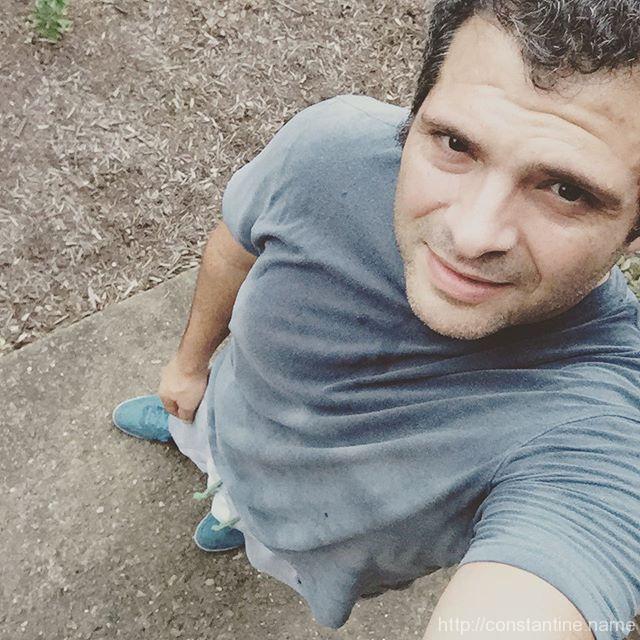I saw this magazine a year (or more?) ago and seriously considered subscribing.
Has anyone read any of them?
Recent PodNews post has discount subscription pricing (and more details)…
https://podnews.net/press-release/good-tape-threat
ɕ
I saw this magazine a year (or more?) ago and seriously considered subscribing.
Has anyone read any of them?
Recent PodNews post has discount subscription pricing (and more details)…
https://podnews.net/press-release/good-tape-threat
ɕ
60 Seconds – with Mandell Conway
What role does storytelling play in driving creativity and engagement in personal projects like podcasting and daily writing?
Mandell Conway and Craig Constantine discuss the art of generosity in podcasting, daily writing challenges, and the power of pushing through creative discomfort.
I’m building the material up. I’m building the reps. I’m getting better and then I can go and say, ‘okay this is the part that I want to keep.’ I’ll share this today. I’ll share this tomorrow. …or I’ll share this next year. But just get in that habit of doing the emotional labor. I think I want to be able to push through that. Versus just saying I would spend 20 minutes and that drained me— [then] ‘yeah, I’m out of here.’ What would happen if I just sat in it for a little longer.
~ Mandell Conway 24:55
Mandell Conway and Craig Constantine explore the concepts of giving and generosity. Mandell speaks about the importance of daily writing, acknowledging the emotional labor involved and discussing the benefits of creating a content backlog for challenging days. They emphasize that the primary goal should be writing, with publishing (in whatever medium) as a natural outcome of this consistent practice. Mandell also offers some perspective on the creative process, emphasizing the commitment required to share impactful stories with the world.
Takeaways
Daily Commitments — the importance of a daily writing or podcasting habit, consistency is key.
Emotional Challenges — writing can be emotionally taxing, but rather than avoiding it, sitting with the discomfort can lead to profound and emotional content. By accepting difficult moments in writing, individuals can develop resilience and produce better work.
Importance of Conversations — the value of discussions between like-minded individuals. Sharing ideas and experiences can spark new insights and innovative approaches to content creation and creative work.
Resources
Giving is Like — Mandell Conway’s web site with his daily email, The Daily Tithe.
Mandell Conway: Giving Within Community — Mandell Conway with Anne Roche on Roche’s podcast, How I Live Through This.
@mandellconway — Mandell Conway on Instagram.
(Written with help from Chat-GPT.)
ɕ
I don’t think ego is good or bad, it simply is. What matters (to me) is what I do, and what I do with my ego. Do I project my ego out onto the world (the way one can project a film onto a live scene in daylight: You can see the original people and things, but the film adds color and shape and, possibly, changes one’s perceptions) and examine and evaluate others colored by my own ego? …or do I try to go deeper and imagine what others might actually be experiencing, what their ego might be like?
Foremost, you must make a decision about your ego.
~ Paul Niquette from, Recommendations: Packing for Ego-Trips
slip:4unibo1.
That insanely deep dive by Niquette is a refreshingly self-aware attempt at proving who should be given credit for inventing the word “software”. The part I’ve linked, isn’t even the last part. I found myself reading and knowing there was a time when I could easily have fed my ego in such a protracted journey— but I don’t think I would have been able (back at that time) to do the self-aware zoom-out that Niquette attempts. Possibly interesting to you; Definitely the sort of thing I find myself mulling over these days.
ɕ
Drawing on my fine command of language, I said nothing.
~ Mark Twain
slip:4a1309.
Reading time: About 6 minutes, 1200 words
Get 7 for Sunday in your inbox. → Subscribe here.
This issue is https://7forsunday.com/3
The situation is even worse if you have no designs on getting ripped and instead just want to build a baseline of capability, whether that’s for hoisting your toddler, shaking off the stiffness of a desk job, or living independently as you age.
~ Amanda Mull from, What the Fitness Industry Doesn’t Understand – The Atlantic
slip:4utehe3.
Back in 2011 or so, when I stumbled into parkour and Art du Déplacement, it was a weekly opportunity for movement and play. There was no goal. There was no larger point to anything that we were doing. We weren’t trying to get ripped or beat our best time running or win at anything in particular. It was simply a merry band of people getting together to play and move, and it was challenging and fun. I (and everyone else) had good days and bad days. We laughed a lot, sometimes someone cried and not too frequently there was just enough blood to demonstrate we were serious. We each faced our fears. We pushed our boundaries and were challenged and supported (figuratively and literally) at the same time. I had never experienced anything like it. Countless times I’ve had similar experiences now—no two days are exactly alike, of course—and it always surprises me just how special it can be to move and play with like-minded people.
If I’m being honest, it’s very rare that I get those experiences these days. Once a month, if I’m lucky, is about the rate. Perhaps. And just this morning we were talking about making some fresh space in our not-actually-really-that-busy lives— a bit of prioritization as it were. I should definitely follow through with that.
ɕ
Hard choices, easy life. Easy choices, hard life. Hard choices means never retiring, because the brain has to be engaged in finding new solutions in the moment, not just remembering old formulas. Hard choices makes us wiser, smarter, stronger, and wealthier, and easy choices reverse our progress, focusing our energies on comfort or entertainment. In every difficult moment ask yourself, “What is a hard choice, and what is an easy choice?” and you will know instantly what is right.
~ Jerzy Gregorek
slip:4a621.
It’s important to take time to think about what we’re reading and not merely assume the thoughts of the author. We need to digest, synthesize, and organize the thoughts of others if we are to understand. This is the grunt work of thinking. It’s how we acquire wisdom.
~ Shane Parrish from, A Meditation on Reading
slip:4ufoso5.
That’s a tiny taste from a delightful and sublime collection of thoughts on reading and books. Which will serve perfectly as an on-ramp to Schopenhauer’s actual essay, On Reading and Books. Which, furthermore, is even linked as a modern PDF from that same page. Wonders never cease.
ɕ
If success is a catalyst for failure because it leads to the “undisciplined pursuit of more,” then one simple antidote is the disciplined pursuit of less. Not just haphazardly saying no, but purposefully, deliberately, and strategically eliminating the nonessentials. Not just once a year as part of a planning meeting, but constantly reducing, focusing and simplifying. Not just getting rid of the obvious time wasters, but being willing to cut out really terrific opportunities as well. Few appear to have the courage to live this principle, which may be why it differentiates successful people and organizations from the very successful ones.
~ From The Disciplined Pursuit of Less
slip:4uhote1.
This is insightful, useful, wise and directly actionable.
ɕ
What can be done to better understand and improve the experience of women in parkour?
Naomi Honey and Melissa Way discuss the importance of women’s experience in parkour, what that means, and how society impacts it. They dig into the unicorn syndrome, the polarization of genders, and how community leaders can help get more women involved. Naomi and Melissa tackle why women’s only events are important, how to create a welcoming environment, and their experiences with unsolicited advice.
I really remember when I was younger, I always thought my arms weren’t skinny like some people’s— oh, it just sounds so ridiculous, but I remember I had that in my head as a benchmark. And then suddenly when I was doing parkour, and when I got my first pull up, it was so exciting. And then suddenly I had a new measure of, oh my God, who cares what they look like? Look what they can do!
~ Naomi Honey (15:00)
The conversation focuses on the experience of women in parkour, emphasizing the unique challenges they face, from differences in physical progression to societal expectations around physical ability. There is discussion around how women’s-only events create supportive spaces that counteract feelings of intimidation or isolation, helping women find community and confidence.
Another key theme is the mindset shift from focusing on aesthetics to valuing functional strength and ability, which parkour uniquely encourages. This change contrasts with societal pressures around appearance, which often disproportionately affect women. The issue of unsolicited advice is also explored, highlighting how it can be well-intentioned but often carries different implications for women, sometimes reinforcing negative stereotypes rather than offering helpful insight.
Takeaways
Progression differences — Women often experience slower physical progression than men in parkour, which can affect confidence.
Mindset shift — Parkour promotes focusing on what the body can do, shifting away from aesthetic-based self-worth.
Role of community — Women’s-only events foster supportive environments that promote sustained engagement and confidence.
Polarization and visibility — The lack of visible female practitioners can create a sense that parkour is not for women, limiting participation.
Impact of unsolicited advice — How advice is given and received differs by gender, with women often facing additional scrutiny or unwelcome input.
Resources
Flytality — Naomi Honey’s life coaching business focused on helping people make life changes.
Project Awesome — A London-based fitness group promoting fun, community-driven exercise.
Women’s International Parkour Weekend (WIPW) — An event aimed at increasing female participation in parkour through community-building and workshops.
(Written with help from Chat-GPT.)
ɕ
Here’s a terrific conversation with Werner Herzog and Jesse Thorn on The Turnaround.
Herzog’s opinion is that one must never go unprepared; always go maximally prepared. But I’m wondering how going in unprepared works with trying to capture conversations that contain the wonder of discovery [by the host.]
ɕ
slip:4c2co3f1.


Captain Sweaty modeling the latest Bullets and matching ‘hard work’ colored t-shirt. Imagine what I could accomplish if I could master the psychology of eating! 2 steps forward, 1.9 steps backwards. every. damn. day. :/
ɕ
Crabbers never have to worry about crabs escaping when they are caught and thrown into a bucket. This is because if one crab starts climbing the walls of the bucket, the other crabs will pull the escaping crab back down.
~ Brad Pilon from, Crabs in a Bucket – Weight Training Over 50
slip:4ubawe6.
ɕ

Walked out the front door, and found this! The best camera is the one you have with you. :^)
ɕ
… the appetite for orthodoxy — the feeling that Americans who will note recite a loyalty oath are not to be valued or trusted, and perhaps should be compelled — is not limited to schools, and not limited to the thugs who once beat and abused Witnesses.
~ Ken White from, «http://www.popehat.com/2013/10/03/the-persistent-appetite-for-orthodoxy/»
ɕ